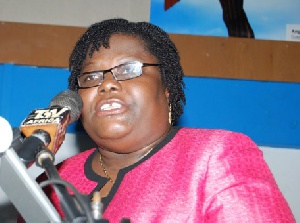 Nana Oye Lithur, Minister of Gender, Children and Social Protection
Nana Oye Lithur, Minister of Gender, Children and Social Protection
Nana Oye Lithur, Minister of Gender, Children and Social Protection has called for a strong collective action towards the elimination of child marriage to accelerate efforts at achieving a safe, healthy, and prosperous future for girls.
“We need to mutually commit to end all human rights violations in order to fully develop as a country, as women and girls form a major part of the nation’s human resource,” she said in a speech read on her behalf.
She made the call at a programme dubbed: “Too Young to Wed” Photo Exhibition in Accra to raise awareness about Child, Early and Forced Marriages (CEFM), through the use of photographs.
The programme is supported by United Nations Population Fund (UNFPA) and the Canadian High Commission.
The Minister said in Ghana, as many as 34,000 girls - less than 15 years - are married annually, while 27 per cent of girls between the ages of 15 and 18 enter marriage often against their will.
The United Nations International Children’s Emergency Fund (UNICEF), the Minister said, estimates that globally, about one in three young women between 20 and 24, thus approximately 70 million girls, were married before the age of 18.
Oye Lithur explained that child marriage was a human rights violation, which infringed on girls’ basic rights to health, education, to live in safety, and to choose when and whom they marry.
“Child marriage undermines girls’ economic capacity and puts women and girls at increased risk of sexual, physical and psychological violence throughout their lives,” she said.
Consequently, she said the Government had supported the abolishment of child marriage by enforcing the existing laws and by sensitising stakeholders on women's reproductive health issues such as fistula, its prevention, treatment and the need for social reintegration.
The Ministry had also embarked on a three-year project, with support from the Dutch Government through UNICEF-Ghana, to strengthen the child protection system to eliminate child marriage.
Ending child marriage, the Minister said, would preserve a girl’s childhood, promote her right to education, reduce her exposure to violence and abuse, and contribute to breaking cycles of poverty that are passed down from one generation to the next.
Consequently, the Ministry had rolled out sexual reproductive health, fistula and child marriage sensitization programmes for queen mothers and stakeholders to raise awareness on issues of child marriage and its harmful effects on Female Reproductive Health across the country, she said.
The Minister commended the efforts of civil society organizations, the media, local communities, development partners and individuals who had worked tirelessly towards the elimination of child marriage in the country.
Mr Christopher Thornley, Canadian High Commissioner to Ghana, said his Mission was pleased that over the last years, international momentum to address child, early, and forced marriages had been building up.
He said Canada was among the countries that supported ending CEFM by 2030 as a post-2015 development agenda priority to mobilize national, regional and global resources on sustainable basis.
Mr Thornley said the Commission was proud to partner with Ghana and the Netherlands to host an event on CEFM, which emphasized the importance of supporting girls to achieve their full potential through education.
Mr Babatunde Ahonsi, UNFPA Representative to Ghana, said child marriage was a violation of the fundamental human rights of the girls who were often the victims, thus resulting in early pregnancy, and social isolation.
He said most child marriages were forced because the consent of the child was not considered before the consummation of the union, which violated several international laws and protocols, which the country had signed onto.
Mr Ahonsi urged all to join the campaign and rise up with a sense of urgency to effectively implement laws and strengthen structures to end harmful cultural practices.